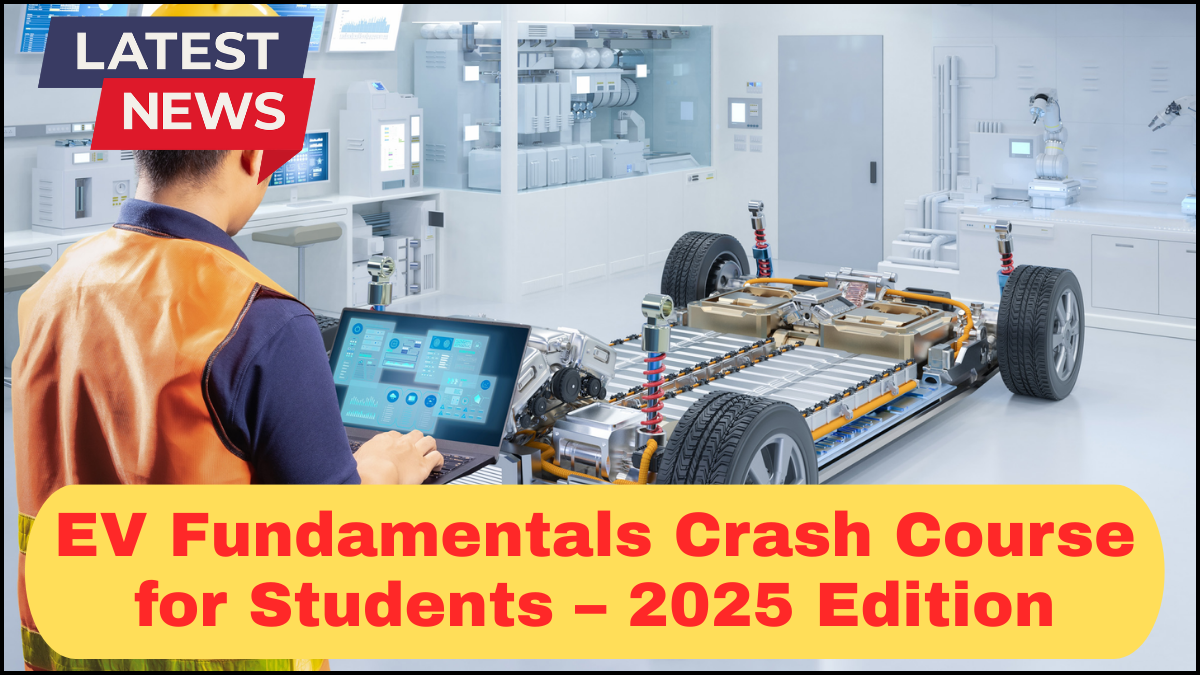As electric vehicles (EVs) dominate the future of transportation, students aiming to upskill in the growing auto tech sector must build a strong foundation in EV fundamentals. The EV Fundamentals Crash Course for Students – 2025 Edition is designed to provide practical, up-to-date knowledge for those who want to stay ahead in this rapidly evolving field. Whether you’re a high school graduate, engineering undergrad, or automotive enthusiast, this crash course offers the critical insights you need.

Why Learn EV Fundamentals in 2025?
EV technology is no longer niche—it’s mainstream. Governments worldwide are phasing out internal combustion engine (ICE) vehicles, and companies like Tesla, BYD, and Ford are ramping up EV production. This transition demands a new skill set—one rooted in electric powertrains, battery technology, and advanced software systems.
By taking an EV fundamentals course, students gain the knowledge to navigate this transformation. It’s not just about understanding cars—it’s about preparing for a career in green technology, mobility innovation, and smart systems integration.
What the EV Fundamentals Course Covers
A well-designed EV fundamentals crash course covers all major technical and practical aspects of electric vehicle systems. Key modules typically include:
1. Introduction to EV Architecture
Students are introduced to the basic layout and working of electric vehicles. This includes:
-
Types of EVs: Battery Electric Vehicles (BEVs), Plug-in Hybrid Electric Vehicles (PHEVs), and Hybrid Electric Vehicles (HEVs)
-
Core components: Electric motors, battery packs, inverters, and controllers
-
Vehicle dynamics and powertrain layout differences between ICE and EV
2. Battery Technology and Management Systems
Battery performance is at the heart of any EV. This section explores:
-
Lithium-ion and solid-state battery chemistry
-
Battery management systems (BMS): thermal control, cell balancing, state-of-charge estimation
-
Charging standards (AC, DC fast charging) and infrastructure trends
3. Electric Motor Types and Control
Students learn how different motors (BLDC, PMSM, AC induction) function, and how they’re controlled through:
-
Motor drivers and inverters
-
Regenerative braking systems
-
Efficiency optimization techniques
4. EV Safety and Maintenance
Since EVs operate at high voltages, safety is a major topic. The course teaches:
-
Electrical insulation and grounding techniques
-
Safety standards and certifications
-
Maintenance differences between EVs and traditional vehicles
5. Software and Connectivity in Modern EVs
With auto tech advancing rapidly, EVs are now digital platforms on wheels. Students gain exposure to:
-
Vehicle-to-Everything (V2X) communication
-
Over-the-air (OTA) updates
-
Embedded systems and real-time diagnostics
How This Course Upskills Students for the Future
The EV fundamentals course does more than teach theory—it empowers students to transition into high-demand auto tech careers. This includes roles in:
-
Electric drivetrain design and testing
-
Battery R&D and thermal management
-
Embedded systems and software engineering
-
EV servicing and diagnostics
Hands-on lab work, real-world case studies, and virtual simulations ensure students graduate with job-ready skills.
Industry Integration and Career Pathways
Many of these courses collaborate directly with automakers, EV startups, and research institutions. Students can benefit from internships, industry talks, and even certification tracks aligned with standards like SAE, ISO, and IEC.
A student who completes this crash course may be positioned to work with companies like Rivian, Tata Motors EV division, Mahindra Electric, or even global Tier 1 suppliers focused on electrification systems.
Flexibility and Access
The 2025 edition of this crash course is available in both online and hybrid formats. Online platforms now offer virtual labs and remote access to hardware kits, making it easier for students across geographies to learn without compromising on depth or quality.
For example, platforms like Coursera, Udemy, or specialized EV tech academies offer modules students can complete at their own pace.
FAQs: EV Fundamentals Crash Course for Students
Q1: Who is this course ideal for?
A: The course is perfect for engineering students, diploma holders in automotive or electrical fields, and anyone looking to enter the EV or auto tech industry.
Q2: Do I need prior experience to take this course?
A: No prior experience is necessary. The course is designed to build foundational knowledge from the ground up.
Q3: Will I get certified after completing the course?
A: Yes. Most platforms offer a certificate of completion, and some provide industry-recognized credentials.
Q4: How does this course help with student upskill?
A: The course equips students with in-demand technical skills directly applicable to current and emerging roles in the EV sector.
Q5: Can this course lead to job opportunities?
A: Yes. Many students transition to roles in EV manufacturing, battery R&D, auto tech software, or electric vehicle maintenance and repair.
click here to learn more